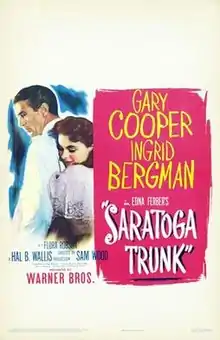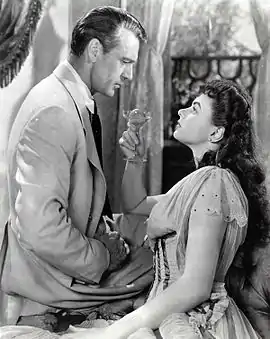Saratoga Trunk
Saratoga Trunk is a 1945 American drama romance western film directed by Sam Wood and starring Gary Cooper, Ingrid Bergman, and Flora Robson. Written by Casey Robinson, and based on the novel Saratoga Trunk by Edna Ferber, the film is about a Texas gambler and the daughter of a Creole aristocrat and his beautiful mistress. They become lovers and work together to seek justice from a society that has ruined their parents and rejected them.
| Saratoga Trunk | |
|---|---|
 Theatrical release poster | |
| Directed by | Sam Wood |
| Produced by | Hal B. Wallis |
| Screenplay by | Casey Robinson |
| Based on | Saratoga Trunk 1941 novel by Edna Ferber |
| Starring | |
| Music by | Max Steiner |
| Cinematography | Ernest Haller |
| Edited by | Ralph Dawson |
| Color process | Black and white |
Production company | |
| Distributed by | Warner Bros. |
Release date |
|
Running time | 135 minutes |
| Country | United States |
| Language | English |
| Budget | $2,393,000[1] |
| Box office | $4,250,000 (US/ Canada rentals) [2][3] or $7,801,000 (worldwide)[1] |
Plot
In 1875, Clio Dulaine, the illegitimate daughter of an aristocratic New Orleans French Creole father and his beloved mistress, returns from Paris to her birthplace in Rampart Street to avenge her recently deceased mother's mistreatment at the hands of her father's family. Clio's mother tried to commit suicide when Dulaine told her that his family had forced him to marry. She accidentally shot and killed him. The Dulaines supported her mother on condition she remain in Paris. Clio is accompanied by her mulatto maid, Angelique, and her dwarf manservant, Cupidon.
Clio repairs the house and goes out to all the best places, claiming to be a Countess and deliberately drawing attention to herself. On Sunday morning, she stops for a bowl of jambalaya at the market and is immediately attracted to Clint Maroon, a tall Texan in a white stetson, lounging nearby—and staring at her. Clint offers to drive Clio to the cathedral, but Angelique interferes. After Mass, they go to Begue's, the restaurant where the Dulaines breakfast every Sunday. When the family—her father's mother, his widow and her daughter, Clio's half-sister—arrives, they recognize her by her resemblance to her mother and leave. Clint and Clio meet again at the restaurant, and he drives her home. He jumps to the wrong conclusion about her intentions; she slams the gate in his face. He writes a letter of apology.
On another Sunday, he slips into the pew next to Clio.
Eventually he moves into her house. They are very much in love, but Clio's plans include marrying a rich and powerful man, for security. Clint, out for revenge against the railroaders who ruined his father, “goes it alone”. He promises Angelique that Clio will be happy, with everything “comme il faut”.
Clint asks her to come to Saratoga Springs with him, but she refuses. On condition that she leave New Orleans never to return, the Dulaines pay her $10,000, agree to destroy the Rampart Street house, to bring her mother's body home and to care for the tomb. Clint writes that Saratoga is “crawling with...respectable millionaires.” At last, Clio's mother is laid to rest; her monument reads “beloved wife”.
At the Saratoga Springs station, wealthy railroad heir Bartholomew Van Steed looks in vain for his mother. (Clio sent a telegram.) Clio crowds her party onto his phaeton; her arrival causes quite a stir. The hotel is booked, and “Colonel Maroon” offers the “Countess” part of his suite. The usher makes great show of bolting the communicating door. The moment he leaves they unlock it. Clint wants her, but Angelique says she needs rest. Clint explains that Bart owns a railroad, the Saratoga Trunk, suddenly worth millions of dollars because it connects the coal country with New England. Railroader Raymond Soule, who is associated with the men who ruined Clint's father, is using violence to force Bart to sell. Clio sleeps for two days and then “Zoomba!” as Angelique says. Mrs. Sophie Bellop a plain-looking but powerful socialite, unexpectedly backs up Clio's story.
Bart is enchanted.
Meanwhile, Clint offers to save the Saratoga Trunk in exchange for shares in the railroad.
Sophie Bellop fends off Bart's mother, Clarissa. She offers to help Clio get Bart, for a price. When Clio declines, Sophie decides to help anyway. Wishing her good luck, Clint goes to Albany. Cupidon secretly boards Clint's train full of men who are taking back the railroad, station by station. Soule sends a train from the other end; the trains crash head on. In the battle that follows, Cupidon is injured protecting Clint.
Preparing for the costume ball, Angelique tells Clio about the battle. Sophie warns her that Clarissa plans to expose her. Clio accuses Bart of cowardice—and he proposes. He knows everything, and he wants her. At the ball, Clint enters, carrying Cupidon, and collapses.
Clio is weeping at Clint's bedside. He pretends to be dreaming of another girl. Clio protests that she loves him. “Rich and respectable that's me,” he says echoing Clio's deepest desire. When she says she will let him wear the pants, he replies “That's all I wanted to hear!” They laugh and kiss, and Cupidon laughs with them.
Cast
- Gary Cooper as Colonel Clint Maroon
- Ingrid Bergman as Clio Dulaine
- Flora Robson (in blackface) as Angelique Buiton
- Jerry Austin as Cupidon
- John Warburton as Bartholomew Van Steed
- Florence Bates as Sophie Bellop
- Curt Bois as Augustin Haussy
- John Abbott as Roscoe Bean
- Ethel Griffies as Clarissa Van Steed
- Louis Payne as Raymond Soule (uncredited)
- Lillian Yarbo as Hotel Maid (uncredited)
Production notes
Ethel Waters and Lena Horne were both considered for the role of Angelique, the Haitian maid. Instead of a woman of color, Warner Bros. cast British actress Flora Robson in dark makeup. This was unusual, as by this time, the use of what was essentially blackface was considered inappropriate and offensive.[4] Robson was nominated for an Academy Award for Best Supporting Actress.[5] Shot in 1943, the film was not released until 1945.[4]
Reception
Box office
The film was Warner Bros.' most popular movie of 1946. According to Warner Bros. records, it earned rentals of $5,148,000 in the U.S. and $2,653,000 elsewhere.[1] According to Variety, the film earned $4,250,000 in theatrical rentals through its North American release.[6]
Accolades
At the 19th Academy Awards, Flora Robson was nominated as Best Supporting Actress.
References
- Warner Bros financial information in The William Shaefer Ledger. See Appendix 1, Historical Journal of Film, Radio and Television, (1995) 15:sup1, 1-31 p 26 DOI: 10.1080/01439689508604551
- "All-Time Top Grossers", Variety, 8 January 1964 p 69
- "60 Top Grossers of 1946", Variety 8 January 1947 p8
- Bogle, Donald (2011), Heat Wave: The Life and Career of Ethel Waters, Harper-Collins, p. 369, ISBN 978-0-06-124173-4
- Awards for Saratoga Trunk at Internet Movie Database.
- "All-Time Top-Grossers", Variety 18 January 1950 p 18
External links
| Wikimedia Commons has media related to Saratoga Trunk. |
- Saratoga Trunk at IMDb
- Saratoga Trunk at the TCM Movie Database
- Saratoga Trunk at AllMovie
- Saratoga Trunk at the American Film Institute Catalog
- Saratoga Trunk on Lux Radio Theater (November 24, 1947)

